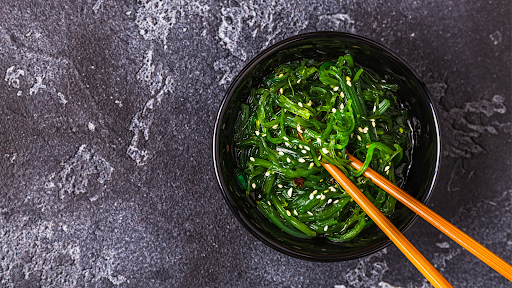Seaweed is an umbrella term that refers to various marine algae and plants. While certain species have been a staple ingredient in East Asian cuisine for centuries, seaweed has recently started to make waves in the west due to its various health benefits. There are hundreds of edible seaweed species out there, but the most common varieties you’ll find are Nori, Wakame, and Kombu.
Here are just a few reasons why you should add more seaweed to your diet!
Health Benefits Of Seaweed
It’s Nutritious
Marine algae is low in calories and high in nutrients.1 2 While the vitamin composition varies between different types of seaweed, vitamins A, B, C, and E are most prevalent. 3 Its aquatic habitat allows seaweed to absorb a considerable amount of minerals relative to terrestrial alternatives. These include calcium, iron and copper. 4
It Supports Gut Health
A healthy gut contains bacteria that supports immunity and promotes physical and mental wellbeing. 5 Seaweed is high in fiber, which helps your gut by promoting metabolic regulation 6. In fact, it can provide up to 12.5% of your daily fiber needs in an 8g serving! 7 It is also a good source of prebiotics, which contribute to a healthy microbiome and in turn prevent certain diseases, including obesity, type 2 diabetes, metabolic syndrome, cardiovascular disease, inflammatory bowel disease, and some cancers. 8 9
It Helps Thyroid Function
Seaweed is rich in iodine, which it accumulates from the sea. 10 This element is essential for healthy thyroid function and seaweed is considered one of the best natural sources. In fact, Kombu can have up to 2000% of the daily recommended intake. 11
Care should be taken not to overindulge though, as an excess of iodine can be harmful to your health.
It’s Rich in Antioxidants
Antioxidants are molecules that help prevent cell damage in your body by keeping free radicals in check. Brown seaweeds are abundant in fucoxanthin, an antioxidant which, according to emerging studies, has the potential to prevent or slow chronic diseases including cancer, obesity, diabetes mellitus, and liver disease. 12
How to Add More Seaweed to Your Diet
Make A Kombu Broth
Also known as Kombu Dashi, this East Asian soup is made with dried kelp and is popular in Japan, China and Korea. It is a vegan dish that can be prepared by either cold or hot brewing kelp, and is considered one of the best sources of iodine.
Snack on Nori
Nori is prepared from a type of red seaweed. You’ll recognize Nori as the dried seaweed often accompanied with sushi dishes. It can also be consumed as a convenient, low-calorie snack that can be enjoyed on the go.
Recipe: Ginger Chicken Wakame Soup
Wakame has a distinct texture and salty flavor with a hint of sweetness. It is often enjoyed on its own or added to noodles or soups. The Northshore Naturopathic Clinic, where a CCNM alumnus practices, has a recipe you can try at home:
Ingredients
- ½ oz (14 g) dried wakame—this is equivalent to ½ cup (125 ml) dried wakame or 1½ cups (375 ml) fresh wakame
- 1 whole boneless, skinless chicken breast
- 4 cups (2 L) water
- 1 thick slice of fresh ginger, about ¼ inch (½ cm) thick
- 3 whole cloves garlic, peeled
- 1 large shallot, peeled and chopped
- 1 small leek, washed and chopped
- 1 tablespoon (15 ml) fish sauce (optional)
- 2½ teaspoons (12 ml) sea salt
- 1 pinch stevia powder
Instructions
Soak wakame in a bowl of warm water for an hour, rinse it in plenty of cold water then chop it into bite-size pieces.
Place the chicken breast in a large pot with 4 cups of water. Bring the water to a boil then reduce the heat to medium. Skim off and discard any foam that rises to the surface. Add the ginger, garlic, shallot, leek, and wakame to the pot then let it simmer for 10 minutes, while covered.
Remove and discard the ginger slice and garlic cloves before adding the fish sauce, sea salt, and stevia. Stir well. If you don’t have fish sauce, simply add more sea salt to taste.
This recipe makes 4 to 6 servings.
Optional: Add 1 cup (250 ml) cooked grain, such as brown rice, barley, or kamut, at the same time as the final ingredients; heat through before serving.








